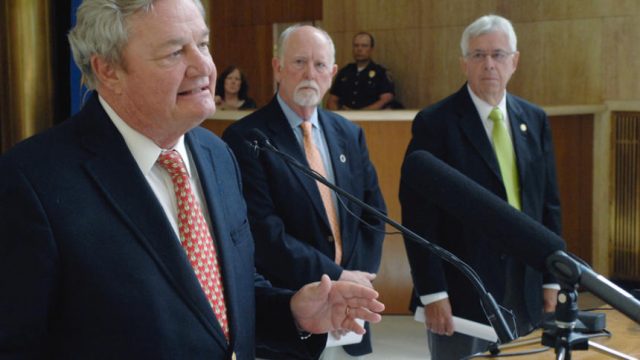Democrats May Introduce Bill to Raise Oil Tax During Special Session

North Dakota Governor Jack Dalrymple, left, announces on 7-13-2016 his decision to call for a special legislative session for Aug. 2, 2016 from Memorial Hall in the state Capitol in Bismarck, North Dakota. In the background is House Majority Leader Al Carlson, R-Fargo, left, and Senate Majority Leader Rich Wardner, R-Dickinson.
On Tuesday next week North Dakota lawmakers will convene in Bismarck for a special session called earlier this month by Governor Jack Dalrymple.
The proceedings will kick off with an address from Dalrymple at 9:30am, at which point he’ll apparently lay out what his specific priorities are for fixing the budget shortfall which necessitated the special session. Priorities that even Republican lawmakers aren’t exactly certain of at this point.
The Democratic super minority has released to the public the specifics of their plan for the shortfall, but so far the Republican plan (really Dalrymple’s plan) has been kept under wraps outside of some hints about using profits from the state-owned Bank of North Dakota to fill in budget holes.
“Al, Rich, and the governor have been working closely with each other to get our obligations funded without additional cuts to corrections and human services,” a Republican lawmaker told me this morning, referring to House Majority Leader Al Carlson and Senate Majority Leader Rich Wardner.
[mks_pullquote align=”left” width=”300″ size=”24″ bg_color=”#ffffff” txt_color=”#000000″]Democrats will claim Republicans cost the state tax revenues because they didn’t force the industry to pay even more by keeping the top tax rate at 11.5 percent (currently the industry is paying 10 percent).[/mks_pullquote]
“I haven’t seen anything specific yet,” he added. He did say that the Republican plan will be encompassed in one bill. Another legislative source backed that up.
“There is only one bill that will be considered and that will be the governor’s bill,” he said.
There is sure to be some grandstanding, though, as a rare special session is the perfect stage for political drama. I’m told that Democrats are expected to demand that an expiring property tax buy down be addressed in the special session, even though it is set to expire after lawmakers meet for the regular session next year.
I’m also told that Democrats may introduce legislation to raise oil taxes even further than Republicans hiked them during the 2015 session.
Through rhetorical gimmicks and factually inaccurate claims the Democrats – Senate Minority Leader Mac Schneider, in particular – have tried to claim that Republicans gave the oil industry a big tax break. In truth, Republicans raised taxes on oil companies significantly, eliminating a tax exemption which so far in 2016 has had the industry paying approximately $183 million more in extraction and production taxes than they would have under the old code.
Democrats have claimed Republicans cost the state tax revenues because they didn’t force the industry to pay even more by keeping the top tax rate at 11.5 percent (currently the industry is paying 10 percent).
It’s a bone Democrats have been gnawing on for years now, but it has gained little traction with the public. Probably because North Dakota voters – outside of the far-left base of the North Dakota Democratic party which has an irrational hatred of the oil and gas industry – recognize solid tax reform when they see it.
Republicans eliminated a huge tax exemption triggered by low oil prices and replaced it with a flatter, slightly lower overall rate. That’s just good policy making.
Also expected is a bill to delay the building of the governor’s residence (which would be a costly mistake, I think) but the lawmakers I’ve spoken to say they don’t see it going anywhere.
All legislation under consideration during the special session will have to come through the Delayed Bills Committee. In regular session all bills introduced before the House and Senate deadlines get a committee hearing and a floor vote. Bills introduced after the deadline – which by definition would be any bill introduced in a special session held after the regular session – go through the Delayed Bills Committee where they can be killed without going to a floor vote.
So Democrats have little chance of passing any legislation they propose. But then, actually making policy isn’t the goal here. Democrats just want a talking point they can tout in their campaigns.
Regardless, Republicans will argue that the scope of the special session should be narrowly focused on immediate fiscal issue, with debate over major policy shifts delayed until the regular session begins in not-that-far-off January.




